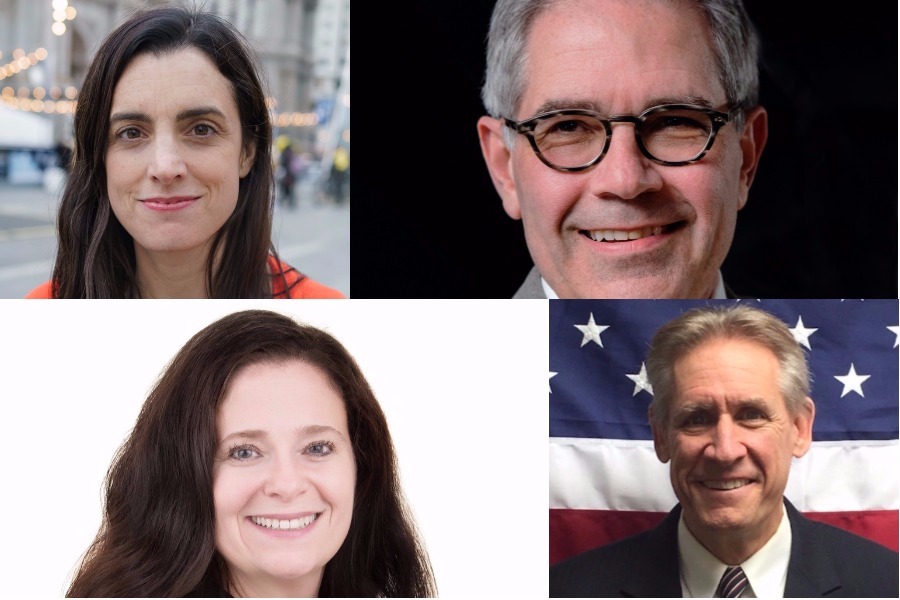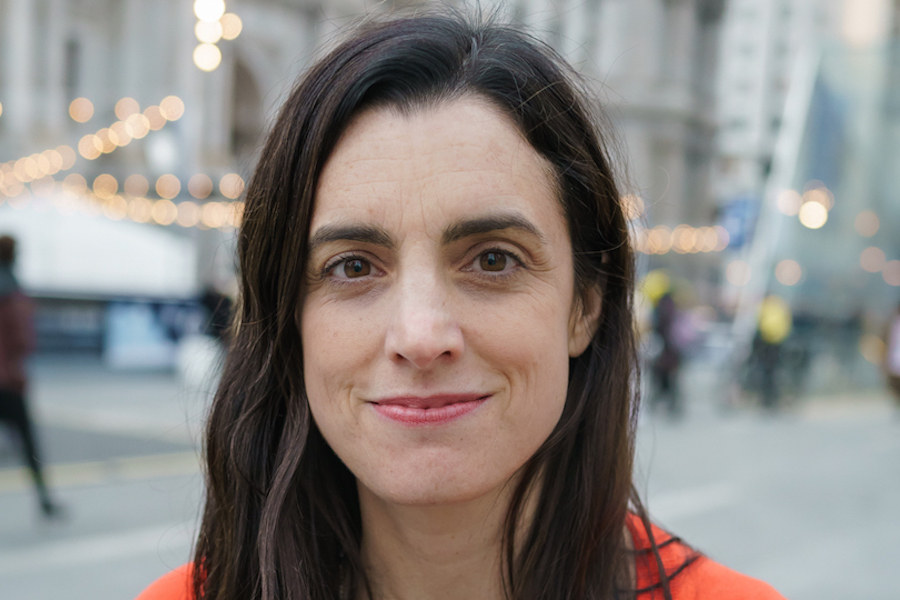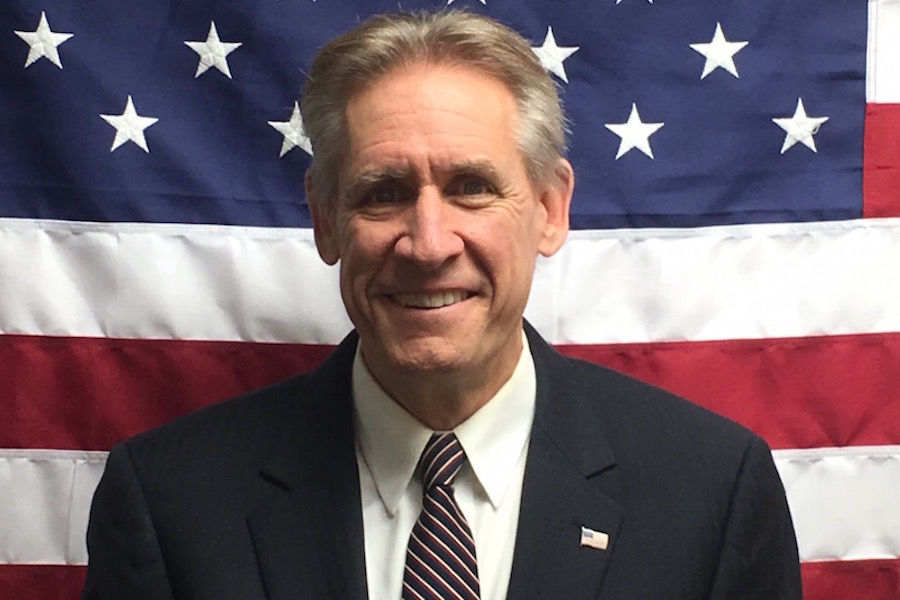The No-Bullshit Guide to the 2017 Philadelphia General Election
You've paid attention to the DA’s race, but know nothing about the controller or judicial elections. Don’t worry: This guide’s got everything you need.

Clockwise: Rebecca Rhynhart, Larry Krasner, Mike Tomlinson and Beth Grossman. | Photos courtesy of each campaign
The last time there was a general election for district attorney of Philadelphia, only 12 percent of registered voters went to the polls.
That means less than one-eighth of the electorate chose the city’s top prosecutor — the official who helps determine whether victims of crime get justice, how many people are put behind bars every year, and if civil asset forfeiture laws are abused or not. In 2013, voters picked Seth Williams, a man who ended up going to prison for taking bribes. So, yeah, your vote on Tuesday matters.
This time around, Philadelphians will have a choice between two candidates whose visions are as starkly different as their résumés. While Democratic nominees for DA are usually treated as shoo-ins in this deep-blue town, some observers think the Republican may actually have a fighting chance this year. Voters tomorrow will also select the next city controller, judges, and election board workers. They’ll have a say as well on a statewide ballot question that asks whether local taxing authorities should be allowed to eliminate property taxes for homeowners.
Don’t fret if you haven’t done your homework on these races. That’s why we do our no-bullshit guide: a ruthlessly honest explanation of each candidate’s strengths and weaknesses. Here are your choices:
District Attorney
The basics: Philadelphia’s district attorney is in charge of one of the biggest prosecutor’s offices in the nation, investigating and prosecuting crimes in the city. The winner of the general election may be Philly’s district attorney for decades: There are no term limits for the position, and former district attorney Lynne Abraham served for almost 20 years.
Democrat Larry Krasner
The basics: 56. Criminal defense and civil-rights attorney. Former public defender.
The case for Krasner …
- He is one of the most progressive big-city DA candidates this country has ever seen. As the Atlantic wrote this week, “Krasner wouldn’t be the first ‘reform-minded’ prosecutor to take office, a term used to describe the growing cohort of district and state’s attorneys vowing to overhaul cash bail, abolish the death penalty, and crack down on police corruption. But he would be the most progressive in this pool, a distinction that takes on extra weight at a time when the Justice Department is moving right.”Krasner promises never to seek the death penalty, never to ask for cash bail for nonviolent offenders, and never to seize someone’s assets if they are not convicted of a crime. He vows to beef up the city’s drug courts and expand opportunities for drug addicts to be diverted out of the criminal justice system. He says he won’t bring cases that are based on illegal frisks and searches. During the Philadelphia primary, Krasner was credited with moving the entire field of Democratic district attorney candidates to the left. (Read our extended Q&A with Krasner here.)
- He’s represented Black Lives Matter, Occupy, and activists at the 2000 Republican and 2016 Democratic national conventions in Philadelphia. After hundreds of RNC protesters were arrested and charged — an incident that came to be known across the nation as an attack on civil rights — Krasner helped get nearly all of them acquitted.
- He’s brawled with the Fraternal Order of Police. Want a DA who will stand up to cops if necessary? Krasner has “sued law enforcement or the government more than 75 times on behalf of clients,” per the Inquirer. Krasner represented ex-Eagles player LeSean McCoy after he allegedly got into a fight with two undercover cops. Krasner convinced Seth Williams to stop calling a group of narcotics officers as witnesses after they were charged by the feds with corruption. (They were later acquitted.) He’s also come out strongly against stop-and-frisk policies, which he says were born of good intentions but lack constitutional guidelines: “We end up in this world where it’s now OK to have occupying armies in certain neighborhoods, who stop people just because they are almost always male, and young, and poor, and very often black and brown.”
- He’s the only candidate who has never been a prosecutor. He says that his lack of experience in the DA’s office is a good thing: Only an outsider can seriously change an institution that incarcerates too many residents and tramples on innocent people’s rights, he claims. His opponent, he says, oversaw the city’s civil forfeiture unit during a time in which it seized million of dollars, often from “perfectly innocent” people. “That is corruption,” he argues.
- He’s put together a political alliance of diverse groups, much like Jim Kenney did in the 2015 mayoral campaign. Krasner has been endorsed by Kenney and many other Democratic local officials, the Black Clergy of Philadelphia and Vicinity, Guardian Civil League, Building & Construction Trades Council, Northeast Regional Council of Carpenters, Philadelphia AFL-CIO, Liberty City LGBT Democratic Club, Our Revolution, Philadelphia Tribune, and Reclaim Philadelphia, among others. He’s also won the support of national figures like Democratic National Committee chair Tom Perez, U.S. Sen. Bernie Sanders, Black Lives Matter activist Shaun King, and leftist actress Susan Sarandon.
The case against Krasner …
- Krasner has zero experience as a prosecutor. If elected, Krasner would oversee one of the biggest prosecutor’s offices in the nation. Every year, there are hundreds of homicides in Philadelphia and even more rapes, assaults, and other violent crimes. Would Krasner really be able to go from defending alleged violent criminals, such as Anthony Eubanks, to fighting them in court? Or will he be soft on crime? And is it possible for a rabble-rouser like Krasner to bring stability to an office that’s been rocked by scandal? Or does he lack the right “mindset,” as the Philadelphia Inquirer editorial board argues, to take the reins?
- Some police officers and assistant district attorneys loathe him. Fraternal Order of Police president John McNesby said in February that it was “hilarious” Krasner was running for DA. During the primary, a dozen former assistant district attorneys penned a letter urging voters not to cast a ballot for Krasner. (A group of sexual assault survivors released a letter criticizing the ADAs’ letter and “the way that our traumatic experiences are being used to demonize Larry Krasner without our consent.”) While it’s unclear whether these law enforcement officials are representative of the majority or a vocal few, it seems likely that there will be some kind of showdown with law enforcement if Krasner wins.
- He’s extremely progressive. If you’re a moderate on criminal justice issues, Krasner may not be the candidate for you.
- A PAC funded by George Soros, the billionaire and Democratic donor, helped make Krasner the Democratic nominee. While Krasner cannot coordinate with the political committee — meaning that he couldn’t make Soros’s money go away even if he wanted to — Krasner hasn’t denounced super PACs. “The reality is the conservatives and Republicans have been using super PACs for a very long time,” he said, “and progressives and liberals have to play the rules of the game as the game exists now.”
Republican Beth Grossman
The basics: 49. Former city prosecutor and chief of staff at Philadelphia’s Licenses & Inspections department.
The case for Grossman …
- She has a center-right platform. In some ways, Grossman is a standard tough-on-crime candidate: She opposes Philadelphia’s “sanctuary city” policy, supports mandatory-minimum sentences for drug dealers, and believes in seeking the death penalty in certain cases. Her campaign consultant compared her to former hard-line DA Lynne Abraham. And earlier this year, Grossman passionately defended the city’s civil forfeiture program, under which officials confiscated cash, homes, and other property from people suspected of crimes, including many who were not convicted or even charged.When it comes to other issues, though, Grossman takes the same position as many Democrats: She promises to divert drug addicts who are charged with simple possession into treatment programs and opposes charges for those found with small amounts of marijuana. She says getting rid of cash bail for lower-level, nonviolent offenders would reduce prison overcrowding. She’s also recently changed her tune on civil forfeiture: According to the Inquirer, Grossman says now that “she would not take property unless the owner was convicted of a crime.” (Read our extended Q&A with Grossman here.)
- She was a prosecutor for almost 20 years. She has served in every unit in the DA’s office. Could that help her fix an institution that was led for the last seven-and-a-half years by a man who admitted to bribery? From 2007 to 2015, she was in charge of the city’s public nuisance task force, where she dealt with abandoned properties, dumping, nuisance bars, and out-of-state landlords. She also oversaw the city’s civil forfeiture program at that time. She argued in March that seizing people’s assets enabled her to fight the opioid crisis and rid the city of drug houses. “A neighbor called to thank me for getting rid of a drug house next door to him. He told me that he could now sit on his porch again,” she told PhillyMag. Grossman says that her opponent has, on the other hand, spent his “entire career” defending “those who have taken people’s lives through gun violence.”
- She isn’t part of Philadelphia’s Democratic machine. She argues that a Democratic district attorney can’t ever truly take on City Hall, and that the Democratic Party’s monopoly on the city has allowed corruption to fester. If elected DA, she says she would focus on making the office more ethical.
- She’s racked up more endorsements than many past Republican DA candidates have, including from several law enforcement groups. Grossman has received support from the Philadelphia Fraternal Order of Police Lodge #5, the local Spanish American Law Enforcement Association, Fraternal Order of Transit Police Lodge #109, the Inquirer, the city firefighters’ union, and Republican state reps Martina White and John Taylor, among others.
The case against Grossman …
- She was in charge of Philly’s civil forfeiture system. As Inquirer and Daily News columnist Will Bunch asked, “Should experience really be considered the No. 1 asset for a new prosecutor when that experience is morally compromised?” During Grossman’s time as public nuisance task force chief, the city’s forfeiture program was lambasted nationally. Journalists reported on cases in which parents and grandparents had their homes seized because, unbeknownst to them, their children were dealing drugs. Earlier this year, a lawsuit claiming that Philly’s civil forfeiture program is unconstitutional gained class-action status; in hopes of ending the lawsuit, the city offered to stop using seized assets to fund the DA’s office and police department. Grossman says that she was merely following the rules when she was in charge of the program. However, the practice of civil forfeiture has been criticized by liberals and conservatives alike in recent years, with Supreme Court Justice Clarence Thomas saying it “has led to egregious and well-chronicled abuses.”
- She worked in the DA’s office for decades, defends much of the status quo, and has been endorsed by the city’s police union. If you want the next DA to dismantle cash bail or the civil forfeiture system, Grossman may not be the right candidate for you. And given that she was endorsed by the FOP, will she aggressively prosecute officers who commit crimes?
- She hired a consultant who pleaded guilty to assaulting his own girlfriend. Some might see that as hypocritical, though she explains it by saying “I believe in second chances.”
- She has appeared on Breitbart Radio Network, where she criticized Soros’s financial support of Krasner. If you think Steve Bannon is one of the worst things to happen to American politics in decades, you might want to look elsewhere.
- She refuses to say whether she voted for Donald Trump. Declining to answer such questions is typical of politicians.
City Controller
The basics: The city controller is the lead auditor of Philadelphia.
Democrat Rebecca Rhynhart
The basics: 43. Former chief administrative officer under Mayor Jim Kenney and budget director under Mayor Michael Nutter. Previously worked at Bear Stearns.

Rebecca Rhynhart | Courtesy of the Rhynhart campaign
The case for and against Rhynhart: In this year’s primary, Rhynhart defeated establishment Democrat and incumbent city controller Alan Butkovitz. It was arguably the biggest political upset of the season. If Rhynhart goes on to win the general election, she will be the first female controller in Philly.
She says her priorities include making the office more transparent and saving taxpayers millions of dollars. She has plenty of financial experience: She was Mayor Michael Nutter’s budget director for six years and oversaw several departments as Kenney’s chief administrative officer. During Rhynhart’s tenure, the city’s bond rating went up. She also helped launch the city’s “reverse bidding” process and its paperless system for contracting services.
Rhynhart has been criticized for working on Wall Street, as well as not doing more to fix the pension system and lack of diversity while she was in government. Rhynhart has shot back that critics have blamed her for issues that she either had no control over or too little time to address.
If elected, Rhynhart would be a top watchdog of the Kenney administration, aka her former boss’s team. Can she scrutinize it fairly? Rhynhart vows to be “independent.” She also argues that “there’s a way to work collaboratively [with the city] while keeping an independent voice.”
Rhynhart has been endorsed by the Inquirer, Philadelphia Tribune, Emily’s List, state Auditor General Eugene DePasquale, Black Clergy of Philadelphia & Vicinity, former Gov. Ed Rendell, Laborers’ District Council, and Millennials in Action, among others. (Read our extended Q&A with Rhynhart here.)
Republican Mike Tomlinson
The basics: 60. Corporate accountant. Previously a high school teacher.

Mike Tomlinson | Courtesy of Tomlinson’s campaign
The case for and against Tomlinson: Tomlinson worked as a corporate accountant for many decades. The Inquirer wrote that his “experience as an auditor for banks and insurance companies qualifies him for the job.” Tomlinson says that he is the true outsider in the race, whereas Rhynhart worked for both the Nutter and Kenney administrations: “The establishment is controlling the controller,” he argues. He also strongly disagrees with Rhynhart’s claim that working “collaboratively” with the mayor is a good idea: “It’s completely inappropriate. … The controller needs to be the independent oversight.” Tomlinson has repeatedly told voters that he is against the soda tax.
Tomlinson says his top goals include strengthening the underfunded pension system, auditing the school district, and cutting waste. He is a member of the Holmesburg Civic Association, Tacony-Holmesburg Town Watch, and Friends of Holmesburg Library. He has previously campaigned for the state House and state Senate in mostly Democratic districts, where, he points out, he received one-third of the vote. He worked on former Republican city controller candidate Terry Tracy’s 2013 campaign, serving as the Northeast director.
Judicial Races
The basics: There are judges up for election and retention on the Pennsylvania Supreme Court, Superior Court, Commonwealth Court, Court of Common Pleas, and Municipal Court. The Pennsylvania Bar Association and Philadelphia Bar Association extensively rated and interviewed the candidates here and here, respectively. The contenders who were not recommended by the Bar Associations are as follows: Deborah Cianfrani, Mark Cohen (yes, that Mark Cohen), Shanese Johnson, James Maurice De Leon III, Marvin L. Williams, Jules Mermelstein (for failure to participate), Mary Murray (for failure to participate), and Irene M. Clark.
Some media outlets, political groups and outspoken citizens have made endorsements in the judicial races, including the Philadelphia Tribune, Pennsylvania Chamber of Business and Industry, AFL-CIO and attorney Michael Coard. The Committee of Seventy and League of Women Voters also have helpful guides to the candidates.
Election Board Workers
The basics: These are the workers stationed at each polling place in Philadelphia. They oversee the city’s elections, enforcing voting rules, helping voters use the voting machines, and readying the polling place for Election Day. That might sound like a boring position, but it’s actually very important — and occasionally prone to shenanigans. Just last month, four Philly election board workers were charged with fraud and voter intimidation. Specifically, a Judge of Elections and Inspector of Elections will be on the ballot Tuesday. The Committee of Seventy has a guide to the races as well as a list of candidates for each job.
Ballot Questions
The basics: Philadelphians will see two ballot questions on Tuesday. One could result in a massive statewide change: It asks Pennsylvanians whether school boards and municipalities should be permitted to exempt homeowners from owing property taxes; the other is a city-only question about whether the local government should borrow $172 million for various capital projects. The questions are broken down into plain English here.
(Portions of this guide were republished from our no-B.S. guide to the 2017 primary.)


